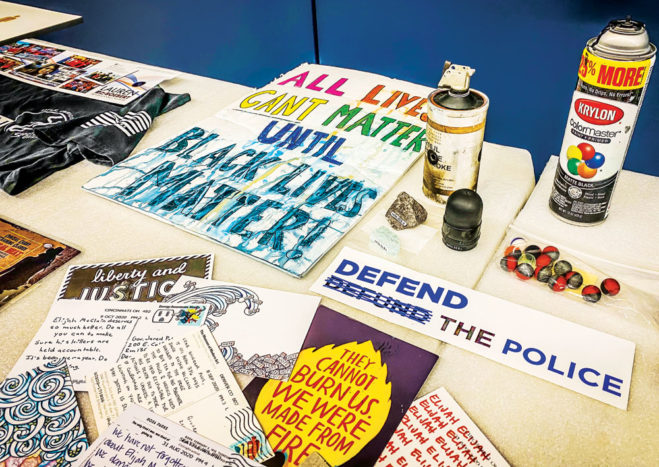
Sympathy cards sent to the family of 23-year-old Elijah McClain, who died after being restrained by police, and items from a protest collected outside the History of Colorado Center including: a tear gas canister, pepper balls, a rubber bullet, and glass from broken museum windows.
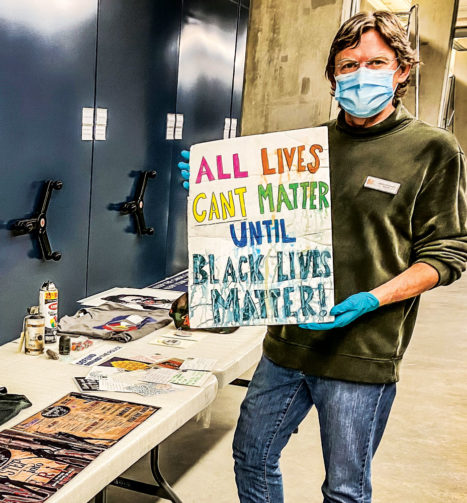
History Colorado Assistant Curator, James Peterson, holds a sign found near the museum the day after a Black Lives Matter protest. Behind him are the vaults where items are stored.
“2020 was a rough year for a lot of people, with big events that had an impact on everybody,” says James Peterson, assistant curator for artifacts at the History Colorado Center museum. Peterson and other museum staff spent the last year collecting items of historical interest related to the pandemic, the Black Lives Matter movement, and the election.
Dubbed History in the Making, the aim of the ongoing collection is to help future generations understand the impact of these events. “Future generations need to refer to the past in order to learn from things,” Peterson said.
— Click for video of Peterson’s interview —
In addition to artifacts—concrete items like masks and hand sanitizers—museum staff are collecting first-hand accounts in the form of journal entries, audio recordings, photographs, and videos. History in the Making was launched in March 2020 when the museum put out a call to its email list and social media sites to collect materials. Staff were on the alert to gather items as events were happening.
“Since 1879 we’ve collected artifacts as events are happening,” Peterson said. “But this year, rather than waiting for donors to come in, we were more proactive about collecting. These events were too important to leave to chance, and it was easy enough for us to get out there as we recognized what was going on.”
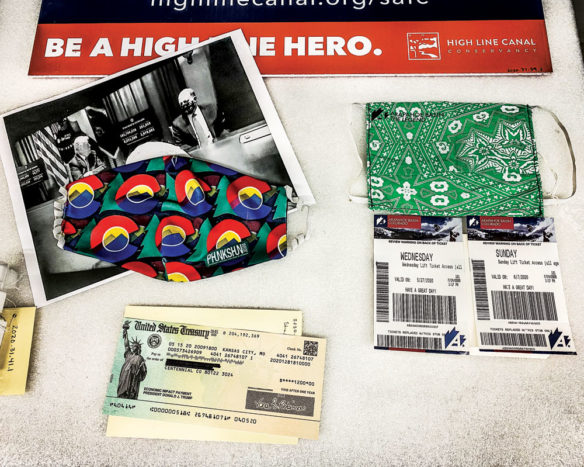
“Keep Your Distance” sign found in the Highline Canal; TV screen shot of Gov. Jared Polis meeting with then-President Donald Trump, along with Polis’ donated mask; a donated stimulus check from the first round; and masks and ski tickets from Arapahoe Basin, which reopened for just one week in the spring.
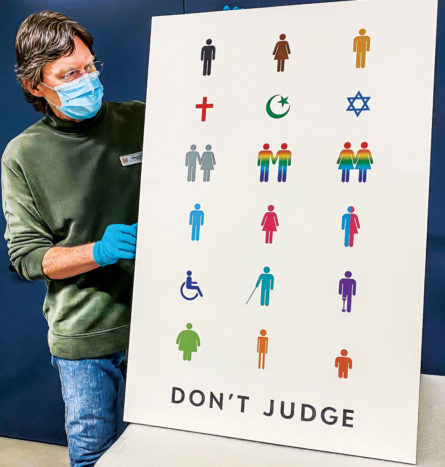
Curator, James Peterson, shows a poster created by two young artists, Brittany Murdock and Angela Serrano, to address prejudice and violence. “The individual icons make a collective statement that regardless of someone’s race, religion, sexuality, gender, disability or size, one should not place unfair judgment onto that person,” they wrote.
From protest signs to photos of the empty streets, the items are being catalogued for researchers and public viewing on History Colorado’s database (go to historycolorado.org/covid-19, click on “See what Coloradans have donated already.”)
Peterson, who has worked at the museum since 2003, said a lot of 2020 items were collected spontaneously. “I fished a sign out of the Highline Canal one day while walking [the sign says, ‘Keep the canal safe. Keep your distance’]. It either fell in there, or someone threw it in who didn’t want to wear a mask.
“During the lockdown, I took a screen shot off my TV of Gov. Polis meeting with President Trump in Washington, D.C. Another curator saw it and said, ‘We need his mask.’ So, Polis donated his mask from that meeting.”
Peterson said he wishes they had a better record of the 1918 pandemic. “Not many three-dimensional artifacts were saved from that time. Either people weren’t proactive about collecting, or medical materials weren’t available. That’s one of the reasons we are being proactive this time around.”
He’s finding current medical items hard to come by. “We want medical equipment used for Covid for our collection, but of course much of it is still in use. We’d love to have empty vials of the vaccine, but so far no luck because those are considered medical waste.”
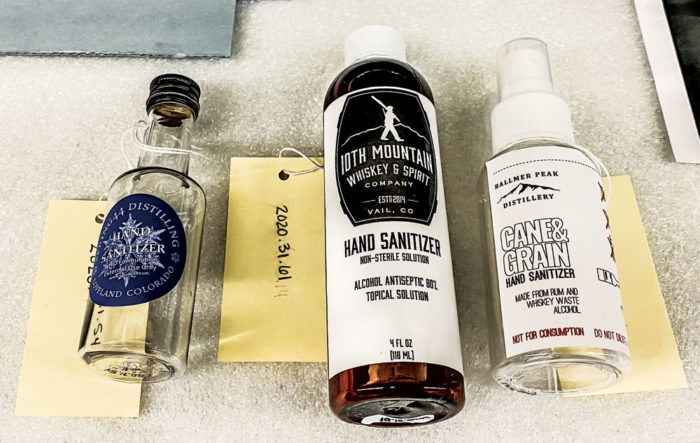
Early in the pandemic, Colorado distilleries converted their operations to make hand sanitizer with their alcohol.
Peterson gathered items related to the 2020 election by attending rallies, including a Lauren Boebert rally in Nucla. “We kept up with the divisive election. We thought artifacts from this time might be important. Maybe in 20 years it won’t be considered history at all, but we just cover our bases. When we’re collecting, there’s not enough time to know whether items are ‘historic.’”
A few items from the Trump campaign are in the collection. “We try to limit our collecting to Colorado, but this administration had an impact on all our lives.”
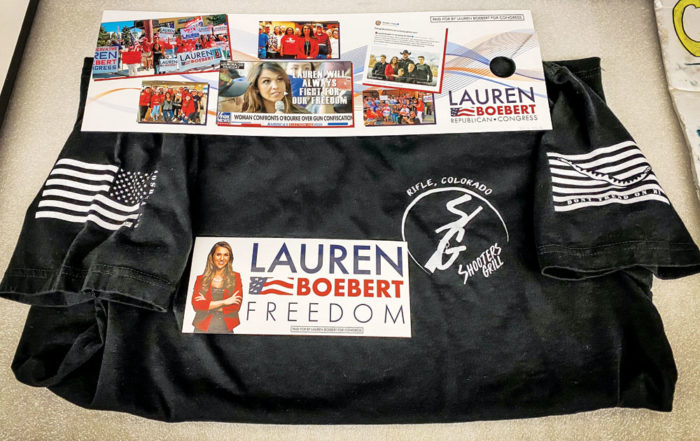
Items from Republican Lauren Boebert’s campaign include a door hanger and bumper sticker, as well as a t-shirt from her Shooters Grill in Rifle. Other Colorado candidate materials were collected, as well as some presidential campaign artifacts.
Peterson said physical objects can make a time period more real. “You look at 1960’s clothes, and you go back to time. Objects can bring history to life.” He emphasized the importance of the stories with the artifacts. He wants MAGA (“Make America Great Again”) caps and the stories that go with them. “Where was it worn? What did it mean to the person who wore it? Personal stories tell the history.”
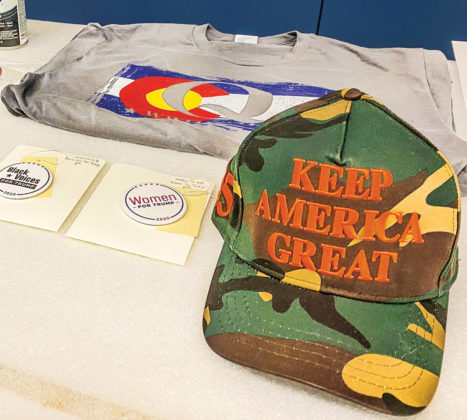
Items associated with former President Trump include: a campaign hat, buttons saying “Black Voices for Trump,” “Women for Trump,” and a QAnon t-shirt.
Written archives and audio-visual materials are a part of the collection. “We welcome more first-hand accounts about how these events have affected people economically, socially, and psychologically. It’s important to document these times before they disappear into the ether.”
No exhibit is planned for the History in the Making collection, Peterson said. “The collection is just here for researchers, catalogued with details as part of our online collections. It could become part of another exhibit in the future.”
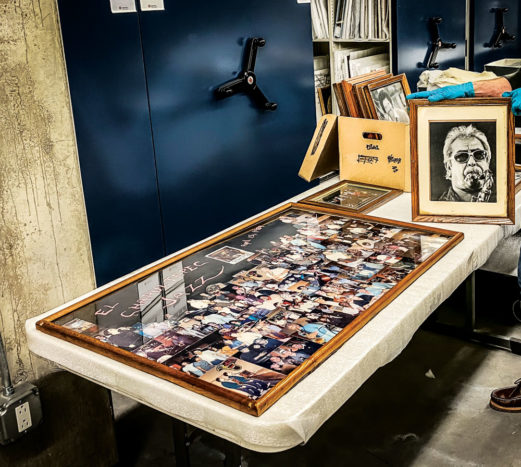
The 87-year-old El Chapultepec jazz club closed down Dec. 8 because of Covid. Depicted are some of the greats who played there, including band leader, Freddy Rodriguez, who died of Covid.
Meanwhile, collecting is an ongoing task. “These issues are still critical, though not as active. The effects linger, like the memories of those who have lost people. We need more personal accounts of the Black Lives Matter protests. I hope we get more material about the effects on the business community.”
To donate an item or story, go to historycolorado.org.
Front Porch photos by Christie Gosch


0 Comments